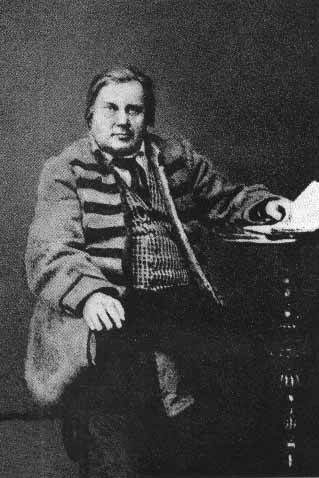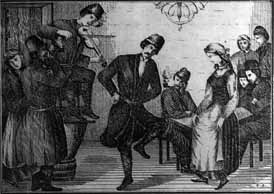![]()

Vincent Dunin-Marcinkievich was born on January 23, 1808 in the estate of Panyushkavichy, close to Babrujsk, in a family of small rank Belarusian noblemen (slyahtich) Ivan Dunin-Marcinkievich. His parents died when he was young, and he was brought up in the families of different relatives. His uncle on mother's side - Stanislau Bogush-Sestrancevich, who was an archbishop of Mahilyow and a writer, was managing education of young Vincent. After graduating from community school in Pinsk he entered Medical School of Vil'na University but was soon forced to leave it because of health problems. He started to work as a secretary in private agency of Baranouski in Vil'na.
After the October uprising in 1830, that was drowned in blood, the cultural development of the area has stalled: the Vil'na University - a center of Belarusian and Lithuanian independent thought was closed by tsar, many magazines and newspapers were forbidden, the monstrous system of imperial police and bureaucracy was wiping out all the remnants of Belarus and Litva from the maps of Europe. Even their names were replaced with a neutral North-Western Side of Empire.
In 1831 Marcinkievich marries Yuzefa Baranouskaya against the will of her parents and leaves for Miensk. He works there in different church archives until finely he purchases in 1840 a small estate of Lyucynka near Ivyanec, where he retires.
It is in 40-ies the first literary probes of Dunin-Marcinkievich appear. The fate of his predecessors in Belarusian literature was very tragic. Pulyuk Bahrym was sent for a 25-year service as a soldier after the uprising in Kroshyn; a close friend of Adam Mickievich - Yan Chahot- was sent into exile to Urals; Ramuald Padbyareski, the author of perhaps first critical review of the New Belarusian Literature in XIX c, was exhiled to Arkhangel'sk, where he died; Frantz Savich, a poet and a revolutionary, was sent as a soldier for 25 into Caucasus; Arcyom Vyaryha-Dareuski was sent to Siberia, for his participation in Kalinouski national liberational uprising in 1863. It is at that time Imperial Archeographic Comission was formed in Vil'na, whose only purpose was to extract facts out of the vast archive of the Litouskaya Metrika, captured by russians, and bend them to prove non-existence of Belarus and Litva as independent states. At such times writing in Belarusian or about Belarus' was a deed of a big civil courage.
The first works of Dunin-Marcinkievich were libretto of operettes (musicles) "Magic Water", "Competition of Musicians" and "Jewish Draft". These were mainly comedies that were showing contemporary characters. No texts have survived and only published good reviews are known.
In 1846 an opera "Idillia" (or "Villager") was printed by Dunin-Marcinkievich in the printing house of Zavadskij, in Vil'na. Essentially this could be considered a first opera in modern belarusian, since all aristocracy is speaking Polish in the oipera, while all peasants - Belarusian (Creeve). As another contemporary belarusian literator - Uladzislau Syrakomlya - has noticed about it: "Bytavaya prauda zahadala autaru peraplyatac' pol'skiya dyyalohi z kryvickimi, adpaviedna tamu, vystupae na scenu pan, akanom ci hto ins^y z s&lyaheckaj parody, s^to razmaulyae pa-pol'sku, abo narod z ulasnaj havorkaj".The ancient genre of idillia or pastoral was chosen to show multiple scenes of the folk life, criticizing the Serfdom and poor conditions of life. "Idyllia" gives a realistic image of the Belarusian village of the 1840-ies. And yet the opera has a lot of romantic hymns to the native land (translation by Y. Kupala):
O kraj moj
lyuby, moj rodny!
Ty znaesh' dumak pryc^yny.
Tut, yak u rai, azdobna,
Cisnucca dzectva uspaminy....
The most part of early lyrics was written by Dunin-Marcinkievich in Polish - the accepted language of belarusian noblemen in XIX c. His favorite topic is love. And he shows all fine nuances of the development of this feeling using the metaphors of a beautiful native land. A romantic image of belarusian land and people surrounding the poet arise from his poems.
The first work completely written in "folk language" - Belarusian - by Dunin-Marcinkievich is his poem "Hapon". The author uses some of the Belarusian folk song lyrics in it. The poem is based on the story of recruitment of a village guy - Hapon - into a 25-year service in Russian army. Belarusian folk life is shown in the poem with a vivid humanism and democracy. "Hapon" became a manifesto and formed an ideological and aesthetical credo of the New Belarusian Literature in XIX c.
As always in Russia changes come only with death of the ruler. On January 18, 1855 tsar Nicholas I has died. New tsar was tied up with war in Crimea and a censorship significantly weakened. The Vil'na censor Kukal'nik signs the permission to publish several books of Dunin Marcinkievich:
 "Hapon"
(see illustration to it on the left) and "Vecharnicy I Apantany" in 1855;.
"Hapon"
(see illustration to it on the left) and "Vecharnicy I Apantany" in 1855;.
"Cikavis^'sya? - Prac^ytaj!" in 1856;
"Belaruski Dudar"("Belarusian pipe-player") in 1857
It was an unusual luck and gift of fate. Until the publishing by Francishak Bahushevich of his "Dudka Belaruskaya" in
1891 these books were the only printed editions in modern Belarusian. The rest of the
literature was circulating underground in scripts.
The works of Dunin-Marcinkievich were fiercely attacked by Polish literators, who were criticizing the very fact of use of Belarusian in Literature:
"Are the works written in contemporary language of Belarusians, regardless of the value of their content, worth of joyful greeting? Is it possible to adjust this language to all requirements of the human thought and style, and develop it into independent language? And is it worth to strive to reach this goal even in the unlikely case that this could be possible?" - was asking the member of the senate of the Polish Kingdom Pan Skibicki.
One of the strongiest supporters of the works of Dunin-Marcinkievich was Uladzislau Syrakomlya. Dunin-Marcinkievich answered these doubts himself in a poem "Ci ya stary?"("Am I old?"):
...Dlya vas,
pany, s^koda halopskaj mnie movy,
Dlya vas, c^ye mudrye nadta halovy,
Maniery salyonau zasvoiushy umela,
Smyayucca z taho, krytykuyuchy smiela,
S^to tut adradzhaecca na rodnyh hlebah
C^uz^oe z^, haj kiepskae, uznosyac' da nieba.
Vas& sud mnie nie stras^ny, haj zlosna skavyc^a
U budcy sabaka, uvahi na psa nie zvyarnu ya.
Yak raic' pyasnyar Syrakomlya, pis^u ya
Cyapier, yak zausyody, na movie muz^yc^aj...
In the 1960-ies the struggle for national independence in Belarus resulted in a1863 uprising lead by Kalinouski. After the suppression of uprising there was a period of strong reaction and censorship. The poem "Halimon na karanacyi" and translation of "Pan Tadeush" of Adam Mickievich into Belarusian, written by Dunin-Marcinkievich were forbidden and confiscated by Russian gendarmes At this time the tsar gendarmes referred to Dunin-Marcinkievich as "the firts and the most energetic agitator of the current disorders". When the last shots of the 1863 uprising were sounding the tsar gendarmes have searched for , arrested and brought Dunin-Marcinkievich into Miensk prison. He was not sent into Siberia because of the age, but he was restricted to his estate of Lyucinka and kept under gendarme observation.
This has not discouraged Dunin-Marcinkievich and he writes at this time his best work - drama of "Pinskaya Shlyahta". In this drama he criticizes severely the lifestyle of the contemporary Belarusan noblemen, doomed for disaster and the tsarist police-bureaucratic system for it's lack of low moral and bribery. He writes in 1868 in his poem "Z-nad Islachy, abo Leki na son...": .
...Syahonnya
usyo inaks^, zmyanilisya I lyudzi,
Syahonnya spekulyacyya - hto bol's^ dabudzie-,
Valodae lyudz'mi; nyamieckiya rahunki,
Adnosiny uvyali uz^o u ins^yya kirunki.
Syahonnya serca nie shukaj, - yano u maniecie,
I pry sustrechah - holad, yak na belym sviecie!
A kraj zbyadnieu, I kan zdabyc' kavalak hlieba,
Nie raz kryvavym potam ablivacca treba.
Dy tol'ki slaby plac^a, yak adc^ue boli,
Nie padae na duhu toj, hto sil'naj voli!...
His last poem "Zalyoty" Dunin-Marcinkievich published in 1870. He spent the rest of his life impreisoned in his estate Lucinka under the constant observation of tsarist regime. At one point he had secretly organized a school for peasnats, but it was soon discovered and forbidden.
Vincent Dunin-Marcinkievich died at the age of 76 in his estate Lyucynka. He lived his life as a Belarusian poet, drama writer, revolutionary and teacher. The seeds of the new Belarusian consciousness that he planted has given great crops as many of the Belarusian poets and writers followed his steps creating the New Belarusian Literature.
Dunin-Marcinkievich V. "Tvory", Minsk, printing house of "Mastackaya
Litaratura", 1984.
The facts of biography were extracted from the foreword to the book by Yazep
Yanushkievich.
UC Berkeley Library PG 2835.D8A5 1984 Main
 This file is a part of
the Virtual Guide to Belarus - a collaborative project
of Belarusian scientists and professionals
abroad. VG brings you the most extensive compilation of the information about Belarus on
the Web.
This file is a part of
the Virtual Guide to Belarus - a collaborative project
of Belarusian scientists and professionals
abroad. VG brings you the most extensive compilation of the information about Belarus on
the Web.
Please send your comments to the authors of VG to
Belarus
History | Statehood | Culture | Law and
Politics | Cities | Nature and Geography |
©1994-04 VG to Belarus
Disclaimer